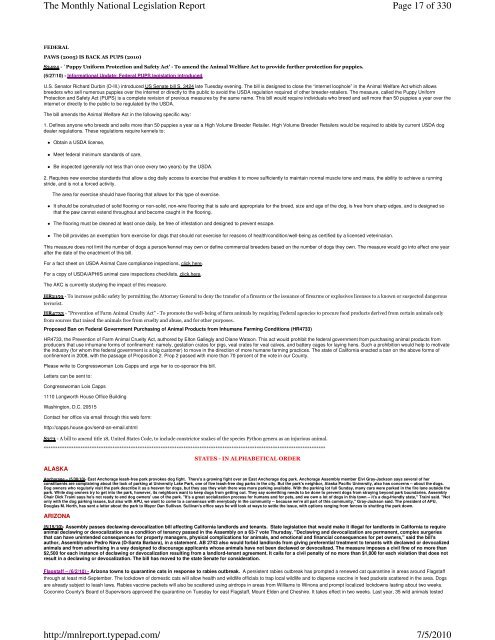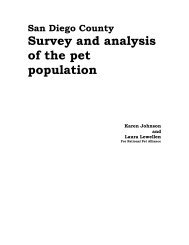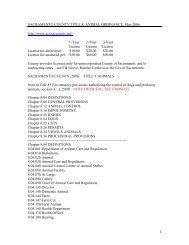Page 1 of 330 The Monthly National Legislation Report 7/5/2010 ...
Page 1 of 330 The Monthly National Legislation Report 7/5/2010 ...
Page 1 of 330 The Monthly National Legislation Report 7/5/2010 ...
Create successful ePaper yourself
Turn your PDF publications into a flip-book with our unique Google optimized e-Paper software.
<strong>The</strong> <strong>Monthly</strong> <strong>National</strong> <strong>Legislation</strong> <strong>Report</strong>http://mnlreport.typepad.com/<strong>Page</strong> 17 <strong>of</strong> <strong>330</strong>7/5/<strong>2010</strong>FEDERALPAWS (2005) IS BACK AS PUPS (<strong>2010</strong>)S3424 - `Puppy Uniform Protection and Safety Act' - To amend the Animal Welfare Act to provide further protection for puppies.(5/27/10) - Informational Update: Federal PUPS legislation introducedU.S. Senator Richard Durbin (D-Ill.) introduced US Senate bill S. 3424 late Tuesday evening. <strong>The</strong> bill is designed to close the “internet loophole” in the Animal Welfare Act which allowsbreeders who sell numerous puppies over the internet or directly to the public to avoid the USDA regulation required <strong>of</strong> other breeder-retailers. <strong>The</strong> measure, called the Puppy UniformProtection and Safety Act (PUPS) is a complete revision <strong>of</strong> previous measures by the same name. This bill would require individuals who breed and sell more than 50 puppies a year over theinternet or directly to the public to be regulated by the USDA.<strong>The</strong> bill amends the Animal Welfare Act in the following specific way:1. Defines anyone who breeds and sells more than 50 puppies a year as a High Volume Breeder Retailer. High Volume Breeder Retailers would be required to abide by current USDA dogdealer regulations. <strong>The</strong>se regulations require kennels to:Obtain a USDA license,Meet federal minimum standards <strong>of</strong> care,Be inspected (generally not less than once every two years) by the USDA.2. Requires new exercise standards that allow a dog daily access to exercise that enables it to move sufficiently to maintain normal muscle tone and mass, the ability to achieve a runningstride, and is not a forced activity.<strong>The</strong> area for exercise should have flooring that allows for this type <strong>of</strong> exercise.It should be constructed <strong>of</strong> solid flooring or non-solid, non-wire flooring that is safe and appropriate for the breed, size and age <strong>of</strong> the dog, is free from sharp edges, and is designed sothat the paw cannot extend throughout and become caught in the flooring.<strong>The</strong> flooring must be cleaned at least once daily, be free <strong>of</strong> infestation and designed to prevent escape.<strong>The</strong> bill provides an exemption from exercise for dogs that should not exercise for reasons <strong>of</strong> health/condition/well-being as certified by a licensed veterinarian.This measure does not limit the number <strong>of</strong> dogs a person/kennel may own or define commercial breeders based on the number <strong>of</strong> dogs they own. <strong>The</strong> measure would go into effect one yearafter the date <strong>of</strong> the enactment <strong>of</strong> this bill.For a fact sheet on USDA Animal Care compliance inspections, click here.For a copy <strong>of</strong> USDA/APHIS animal care inspections checklists, click here.<strong>The</strong> AKC is currently studying the impact <strong>of</strong> this measure.HR2159 - To increase public safety by permitting the Attorney General to deny the transfer <strong>of</strong> a firearm or the issuance <strong>of</strong> firearms or explosives licenses to a known or suspected dangerousterrorist.HR4733 - "Prevention <strong>of</strong> Farm Animal Cruelty Act" - To promote the well-being <strong>of</strong> farm animals by requiring Federal agencies to procure food products derived from certain animals onlyfrom sources that raised the animals free from cruelty and abuse, and for other purposes.Proposed Ban on Federal Government Purchasing <strong>of</strong> Animal Products from Inhumane Farming Conditions (HR4733)HR4733, the Prevention <strong>of</strong> Farm Animal Cruelty Act, authored by Elton Gallegly and Diane Watson. This act would prohibit the federal government from purchasing animal products fromproducers that use inhumane forms <strong>of</strong> confinement: namely, gestation crates for pigs, veal crates for veal calves, and battery cages for laying hens. Such a prohibition would help to motivatethe industry (for whom the federal government is a big customer) to move in the direction <strong>of</strong> more humane farming practices. <strong>The</strong> state <strong>of</strong> California enacted a ban on the above forms <strong>of</strong>confinement in 2008, with the passage <strong>of</strong> Proposition 2. Prop 2 passed with more than 70 percent <strong>of</strong> the vote in our County.Please write to Congresswoman Lois Capps and urge her to co-sponsor this bill.Letters can be sent to:Congresswoman Lois Capps1110 Longworth House Office BuildingWashington, D.C. 20515Contact her <strong>of</strong>fice via email through this web form:http://capps.house.gov/send-an-email.shtmlS373 - A bill to amend title 18, United States Code, to include constrictor snakes <strong>of</strong> the species Python genera as an injurious animal.***************************************************************************************************************************ALASKASTATES - IN ALPHABETICAL ORDERAnchorage – (5/30/10)- East Anchorage leash-free park provokes dog fight. <strong>The</strong>re's a growing fight over an East Anchorage dog park. Anchorage Assembly member Elvi Gray-Jackson says several <strong>of</strong> herconstituents are complaining about the lack <strong>of</strong> parking at University Lake Park, one <strong>of</strong> five leash-free dog parks in the city. But the park's neighbor, Alaska Pacific University, also has concerns -- about the dogs.Dog owners who regularly visit the park describe it as a heaven for dogs, but they say they wish there was more parking available. With the parking lot full Sunday, many cars were parked in the fire lane outside thepark. While dog owners try to get into the park, however, its neighbors want to keep dogs from getting out. <strong>The</strong>y say something needs to be done to prevent dogs from straying beyond park boundaries. AssemblyChair Dick Traini says he's not ready to end dog owners' use <strong>of</strong> the park. "It's a great socialization process for humans and for pets, and we own a lot <strong>of</strong> dogs in this town -- it's a dog-friendly state," Traini said. "Notonly with the dog parking issues, but also with APU, we want to come to a consensus with everybody in the community -- because we're all part <strong>of</strong> this community," Gray-Jackson said. <strong>The</strong> president <strong>of</strong> APU,Douglas M. North, has sent a letter about the park to Mayor Dan Sullivan. Sullivan's <strong>of</strong>fice says he will look at ways to settle the issue, with options ranging from fences to shutting the park down.ARIZONA(5/15/10)- Assembly passes declawing-devocalization bill affecting California landlords and tenants. State legislation that would make it illegal for landlords in California to requireanimal declawing or devocalization as a condition <strong>of</strong> tenancy passed in the Assembly on a 63-7 vote Thursday. "Declawing and devocalization are permanent, complex surgeriesthat can have unintended consequences for property managers, physical complications for animals, and emotional and financial consequences for pet owners," said the bill'sauthor, Assemblyman Pedro Nava (D-Santa Barbara), in a statement. AB 2743 also would forbid landlords from giving preferential treatment to tenants with declawed or devocalizedanimals and from advertising in a way designed to discourage applicants whose animals have not been declawed or devocalized. <strong>The</strong> measure imposes a civil fine <strong>of</strong> no more than$2,500 for each instance <strong>of</strong> declawing or devocalization resulting from a landlord-tenant agreement. It calls for a civil penalty <strong>of</strong> no more than $1,000 for each violation that does notresult in a declawing or devocalization. <strong>The</strong> bill has moved to the state Senate for consideration.Flagstaff – (6/2/10) - Arizona towns to quarantine cats in response to rabies outbreak. A persistent rabies outbreak has prompted a renewed cat quarantine in areas around Flagstaffthrough at least mid-September. <strong>The</strong> lockdown <strong>of</strong> domestic cats will allow health and wildlife <strong>of</strong>ficials to trap local wildlife and to disperse vaccine in feed packets scattered in the area. Dogsare already subject to leash laws. Rabies vaccine packets will also be scattered using airdrops in areas from Williams to Winona and prompt localized lockdowns lasting about two weeks.Coconino County's Board <strong>of</strong> Supervisors approved the quarantine on Tuesday for east Flagstaff, Mount Elden and Cheshire. It takes effect in two weeks. Last year, 35 wild animals tested




